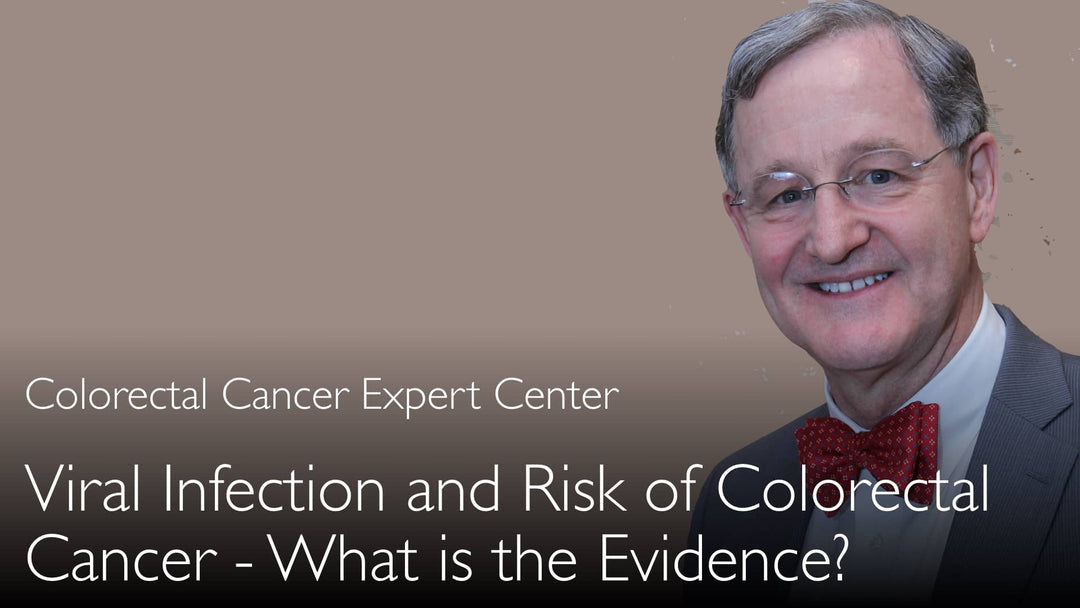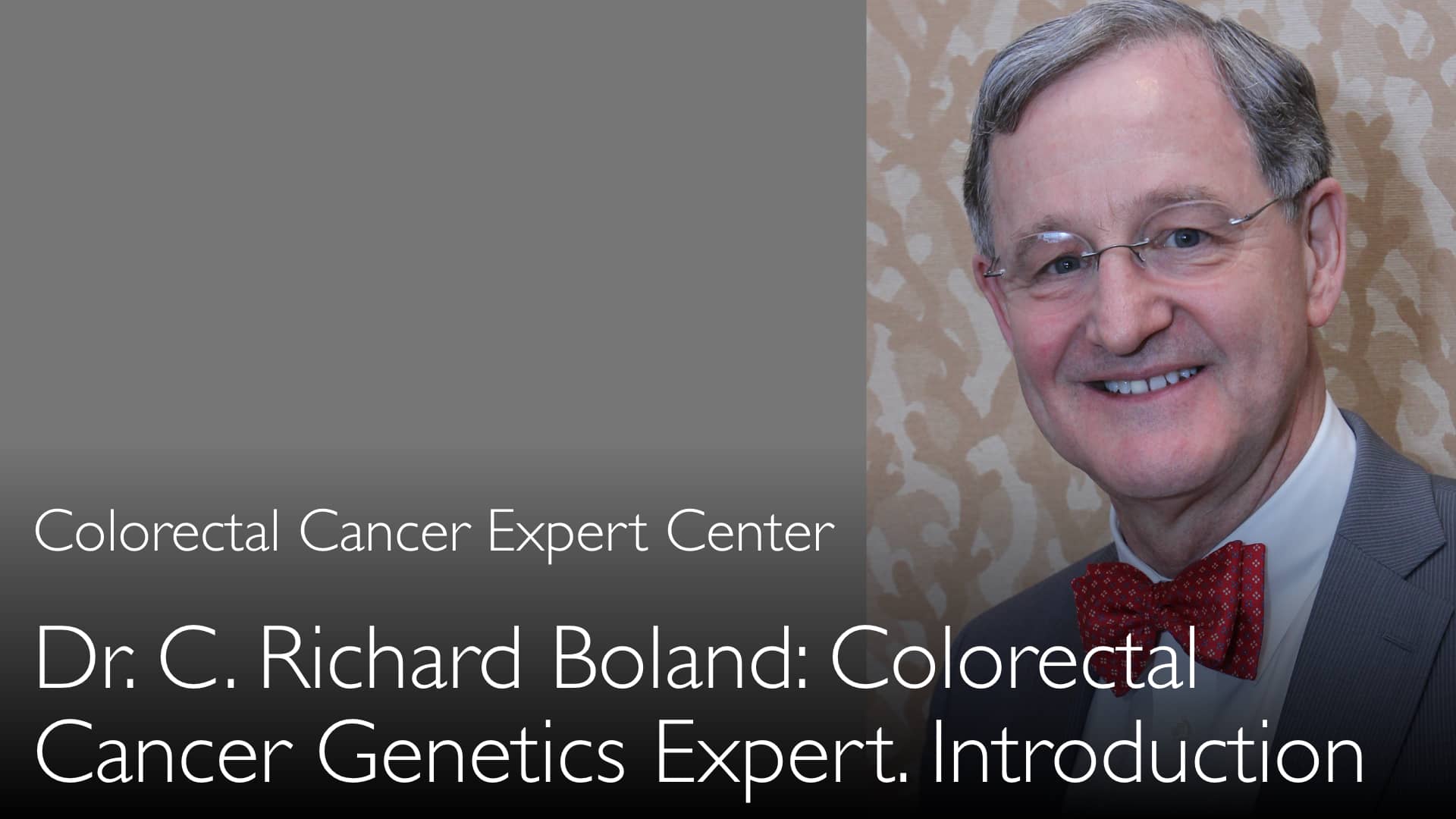Dr. C. Richard Boland, MD, a leading expert in colorectal cancer genetics, explores the potential link between viral infections and the development of colorectal cancer. He discusses the JC virus hypothesis, research challenges, and why vaccination strategies remain an appealing—yet unproven—approach to cancer prevention.
Virale infektioner og risiko for kolorektal cancer: Aktuel forskning og JC-virus-hypotesen
Spring til afsnit
- Øger vira risikoen for kolorektal cancer?
- JC-virus og tyktarmskræft: Den oprindelige hypotese
- Udfordringer i at bevise virale kræftsammenhænge
- Hvordan JC-virus T-antigen kunne transformere celler
- Aktuel forståelse af vira og tyktarmskræft
- Kunne vacciner forebygge virusrelateret kræft?
- Fuld transskription
Øger vira risikoen for kolorektal cancer?
Selvom genetiske mutationer og inflammation er veletablerede risikofaktorer for kolorektal cancer, undersøgte Dr. C. Richard Boland og hans kolleger, om virale infektioner også kunne bidrage til udviklingen af tyktarmskræft. Denne forskning var inspireret af den kendte sammenhæng mellem Helicobacter pylori-infektion og mavekræft.
Dr. Boland forklarer, at infektionsagenser kan forårsage kronisk inflammation og direkte skade DNA – to mekanismer, der teoretisk set kunne øge kræftrisikoen. Tarmens konstante eksponering for mikroorganismer gør den til en oplagt kandidat for sådanne virus-kræft-sammenhænge.
JC-virus og tyktarmskræft: Den oprindelige hypotese
Midt i 1990'erne fremsatte Dr. Bolands team hypotesen om, at JC-virus, et almindeligt polyomavirus, kunne spille en rolle i kolorektal cancer. Deres tidlige forskning med følsomme PCR-teknikker påviste JC-virus i de fleste undersøgte tyktarmsvævsprøver.
"En JC-virusinfektion kunne forklare forskelle i tyktarmskræftfrekvens mellem populationer," bemærker Dr. Boland. Indledende resultater så lovende ud, hvor nogle laboratorier kunne gentage deres resultater, mens andre ikke kunne – en typisk udfordring i viral onkologiforskning.
Udfordringer i at bevise virale kræftsammenhænge
Efter to årtiers forskning med forbedrede tekniker aftog Dr. Bolands entusiasme for JC-virus-hypotesen. Mere præcise kvantificeringsmetoder afslørede, at JC-virus ikke konsekvent var tilstede i tilstrækkeligt mange tyktarmskræfttilfælde til at understøtte en kausal rolle.
"De fleste mennesker har JC-virus-antistoffer, hvilket betyder, at vi alle har været eksponeret," forklarer Dr. Boland. Denne udbredte eksponering gjorde indledende korrelationer vanskelige at fortolke. Immunresponsundersøgelser, der sammenlignede kræftpatienter og raske kontroller, viste ingen væsentlige forskelle i JC-virusimmunitet.
Hvordan JC-virus T-antigen kunne transformere celler
JC-virus-teorien var biologisk plausibel, fordi dets T-antigen-protein er en potent kræftfremkaldende agens. "T-antigen binder DNA, bryder det og inaktiverer de afgørende tumorsuppressorproteiner p53 og retinoblastom," beskriver Dr. Boland.
I laboratoriemiljøer transformerer JC-virus T-antigen pålideligt normale celler til kræftceller. Denne kraftige transformerende evne gjorde oprindeligt JC-virus til en overbevisende kandidat til at bidrage til menneskelig tyktarmskræft.
Aktuel forståelse af vira og tyktarmskræft
Selvom JC-virus-hypotesen ikke er blevet understøttet af den akkumulerede evidens, understreger Dr. Boland værdien af at udforske infektøse kræftårsager. "Det er stadig en interessant idé," siger han, "selvom dataene ikke har understøttet JC-virus' rolle i tyktarmskræft, som vi oprindeligt troede."
Forskningen fremhæver, hvor svært det er at bevise virale bidrag til kræft, især når den mistænkte virus er næsten allestedsnærværende i populationen.
Kunne vacciner forebygge virusrelateret kræft?
Dr. Boland reflekterer over det tiltalende koncept med kræftforebyggende vacciner: "Hvis man kunne identificere en viral årsag, kunne man udvikle en vaccine mod den pågældende kræft – som vi har gjort med HPV og livmoderhalskræft."
Mens en JC-virusvaccine til forebyggelse af tyktarmskræft nu virker usandsynlig, fortsætter søgningen efter andre infektionsagenser, der kunne bidrage til gastrointestinal kræft. Sådanne opdagelser kunne en dag føre til nye forebyggelsesstrategier.
Fuld transskription
Dr. Anton Titov, MD: Sammenhæng mellem viral infektion og kolorektal cancer. Kan vira øge risikoen for tyktarmskræft? Kan en vaccine reducere risikoen for tyktarmskræft? Fremtrædende ekspert i kolorektal cancer-genetik diskuterer tyktarmskræftdiagnose og behandling.
Meget forskning har fokuseret på genetiske mutationer, der leder til udvikling af kolorektal cancer. Vi har netop drøftet inflammationens rolle i kræftudvikling. Inflammation øger risikoen for gastrointestinal kræft. Der er en anden vigtig risikofaktor for kræft: infektion.
Dr. Anton Titov, MD: De og Deres kolleger har undersøgt den potentielle rolle af virale infektioner i udvikling af kolorektal cancer. Hvad vides i øjeblikket om den potentielle rolle af vira i udvikling af kolorektal cancer? Hvad er kontroverserne og ubesvarede spørgsmål?
Dr. C. Boland, MD: Der er ingen tvivl om, at Helicobacter pylori-infektion i maven er involveret i meget mavekræft. Så vi spekulerede på, om der var noget lignende ved infektion i tyktarmen, der forårsagede tyktarmskræft.
Midt i 1990'erne hypoteserede vi, at JC-virus kunne være en infektionsagens, der bidrager til dannelsen af tyktarmskræft. JC-virus er et polyomavirus. Måske ville en JC-virusinfektion forklare forskelle i tyktarmskræft fra en population til en anden.
Vi brugte meget følsomme PCR-baserede teknikker og fandt JC-virus i de fleste tyktarme, vi undersøgte. Så forsøgte andre laboratorier at reproducere disse resultater, men de kunne ikke. Nogle laboratorier reproducerede dog vores resultater om JC-virus og kunne bekræfte vores data. Alle fund var meget ens.
T-antigen er JC-virus' transformerende faktor. Vi fandt, at T-antigen blev udtrykt i tyktarmsvæv – så JC-virus var en meget sandsynlig skyldig. Fordi JC-virus koder for utroligt potent transformerende gener, der omdanner celler til kræft. T-antigen binder DNA og bryder det, og inaktiverer p53 og retinoblastomproteinerne.
T-antigen af JC-virus er et af de mest nyttige laboratorieredskaber til at skabe kræft.
Dr. C. Boland, MD: For at gøre en lang historie kort, vi har gennemgået omkring 20 års eksperimentering. Da vi endelig havde meget bedre teknikker til at kvantificere JC-virus i tyktarmskræft og i normal tyktarm, syntes det bare ikke at være tilstede i tilstrækkeligt mange tyktarme.
Jeg er nu ikke så sikker på, at JC-virus virkelig spiller en aktiv rolle i tyktarmskræft. Problemet er, at de fleste mennesker har antistoffer mod JC-virus – vi har alle været eksponeret for det. Så det syntes at være en plausibel bidragende faktor til tyktarmskræft.
Vi kiggede på forskelle i immunresponset mod T-antigen af JC-virus blandt mennesker, der havde tyktarmskræft, og som ikke havde. Der var ikke en væsentlig forskel.
Så JC-virus og tyktarmskræft-sammenhængen var en idé, vi havde et stykke tid. Men det er virkelig ikke en idé, som jeg er meget entusiastisk omkring nu. Fordi dataene ikke har understøttet, hvad jeg troede, rollen for JC-virus i tyktarmskræft var i begyndelsen.
Men det er en meget interessant hypotese. For hvis man kunne identificere visse virale infektioner i kræft, kan man opfinde en vaccine mod den kræft. Det var idéen fra begyndelsen. Vi ville elske at finde på den perfekte vaccine til at afskaffe en form for kræft. Som at afskaffe rygning.





